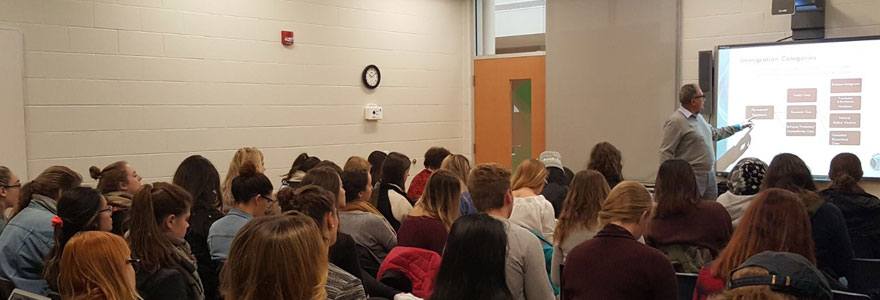News and Updates
Contact
Faculty of Social Science
Social Science Centre
Room 9438
Western University
T. 519-661-2053
F. 519-661-3868
E. social-science@uwo.ca
Understanding our place in the world, through community engagement
December 06, 2017
Anthropology students at Western University were provided first-hand opportunities to learn more about refugees, through a new community engagement initiative.
Students in ANTH 2283F, Refugees and the Displaced: An Anthropological Approach to Forced Migration, taught by Randa Farah, volunteered at programs offered by the South London Neighbourhood Resource Centre, to develop a better understanding of the newcomer experience.
The course “covers many aspects of involuntary displacement,” said Farah. “People can be displaced by environmental factors, or for reasons of poverty. There are also internally displaced people. It is not just refugee status, which is a legal term.”
“The community connection gives students a chance to learn something in theory and then actually meet people, and be better able to see the links and understand how policy affects people,” said Farah. “They can see if or how centres respond to the needs of newcomers.”
Farah chose to work with the centre because it provides services to many different groups, including refugees, other newcomers, and established Canadians.
“The centre provides a broader range of experiences, and is more of a connected space and reflective of the actual community,” said Farah.
Students first travelled to the SLNRC, learned about the programs offered and how it was funded. They were given the opportunity to volunteer with different community programs, and asked to reflect on their experiences.
Tiffany Ma is a Health Sciences student, minoring in Anthropology. She said volunteering helped personalize the refugee experience. “The community interaction helped me take into consideration the lived experience of refugees, and see their culture and history,” Ma said. “It helped show them not as their status, but as people.”
Danielle Frinton is completing her Honors Specialization in Anthropology with a minor in Refugee and Migration Studies. She volunteered with a group of 11 and 12 year old girls.
Frinton said the girls she worked with had trouble with marginalization when they arrived in Canada, due to language and religious differences. Frinton said they were often see as their status, and not as individuals. “They were always talked to by people outside the centre as if they were hurt,” said Frinton. “They felt people would talk to them for the rest of their lives like that.”
Catherine Gallant is completing her Honors Specialization in Anthropology. Through her experience, she found that for many school age refugees, “there was no group support or support within school for learning the language.”
“Engagement is really important,” said Gallant. “It’s good to start this in 2nd year, and it’s good to step out of the classroom and interact with the world.”
This was the first time Farah has offered the community-engagement aspect of the course, but she wants to continue to develop relations with the centre.
“The experience gave an opportunity to apply our knowledge, and apply our social skills,” Frinton said. “It also gave a chance to learn how to approach research in an ethical way and get informed consent. This experience was the best thing she (Farah) could have done.”
“It’s a very good opportunity to understand where the university is centre, within the city, and the responsibility we have to the community, and how we can contribute,” said Farah.

